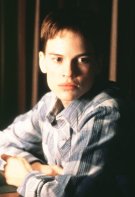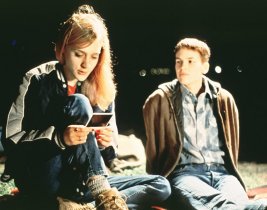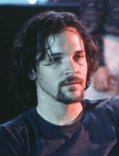|
Boys Don't
Cry
|
| |
 |
USA, 1999.
Rated R. 116 minutes.
Cast: Hilary Swank, Chloë
Sevigny, Peter Sarsgaard, Brendan Sexton, Alison Folland, Alicia Goranson,
Jeanetta Arnette, Matt McGrath, Rob Campbell
Writers: Kimberly Peirce & Andy Bienen
Music: Nathan Larson
Cinematographer: Jim Denault
Producers: John Hart, Eva Kolodner, Jeff Sharp, Christine Vachon
Director: Kimberly Peirce
|
| Grade: A |
Review
by Carlo Cavagna |
 hen
they tell you that Boys Don't Cry is about homophobia, you may be
tempted to think that it's just another movie-of-the-week brought to the
big screen, two hours full of boilerplate platitudes and canned morality.
When you hear that Boys Don't Cry is based on a true story about
a young woman who lived as a man in the Heartland and who was murdered when
her secret was discovered, you may wonder why you even need to see the movie.
You know how it ends; you know what the message is going to be. It might
seem like the cinematic equivalent of a hunk of spinach–good for you, plenty
of fiber,
hen
they tell you that Boys Don't Cry is about homophobia, you may be
tempted to think that it's just another movie-of-the-week brought to the
big screen, two hours full of boilerplate platitudes and canned morality.
When you hear that Boys Don't Cry is based on a true story about
a young woman who lived as a man in the Heartland and who was murdered when
her secret was discovered, you may wonder why you even need to see the movie.
You know how it ends; you know what the message is going to be. It might
seem like the cinematic equivalent of a hunk of spinach–good for you, plenty
of fiber,  but
not particularly appealing.
but
not particularly appealing.
Nothing could be further from the truth. While other Fall
1999 movies like American Beauty
and Fight Club monopolize public
and critical attention, Boys Don't Cry slips through the cracks and
blindsides you with raw, unvarnished power. As good as American Beauty
is, some of the glib observations and plot conveniences ring false. American
Beauty is just a movie, after all. But Boys Don't Cry isn't just
a movie. And it most certainly isn't "about" any single abstract concept–homophobia
or anything else. Boys Don't Cry is a real life drama, and a reminder
that real life dramas are often more moving and complex than any concocted
script.
Boys Don't Cry is the story of a group of young people in Falls City,
Nebraska, where a flammable combination of personalities and events ignited
in late December, 1993. But director Kimberly Peirce doesn't care about the
sensationalistic events as much as she does about the people at the heart of
the story. How did these particular people wind up as tabloid fodder?
Who were they? What inspired them, and what frightened them? What did they seek,
and what did they find?
AboutFilm.Com
The Big Picture
|
| Carlo |
A
|
| Alison |
A-
|
| Kris |
-
|
| Dana |
B
|
| Jeff |
B+
|
Peirce immerses us in the world of 20-year-old Teena Brandon, who lived as
Brandon Teena, a man, and loved a teenager named Lana Tisdel. Actually, we never
really meet Teena, because she doesn't exist. There is only Brandon. It's not
just that Brandon cultivates a masculine appearance, with his hair cut short
and his breasts strapped down. Every gesture, every expression, every turn of
phrase suggests hat he is a man. When people look at Brandon, it doesn't even
occur to them that he might be a woman. Most of the time, it doesn't occur even
to Brandon that he is a woman. In fact, when you watch Brandon and Lana's intimate
moments, you may yourself forget that you are watching–oh my!–two women. Brandon
is not cross-dressing by choice. He is cross-dressing because he is a man trapped
in a woman's body, and must alter his outward appearance to match his inner
self.
Brandon is also a petty criminal. He shoplifts and steals cars so he can afford
to hang out in bars and go out on dates. In trouble with the law and known to
be female in Lincoln, Nebraska, Brandon moves to Falls City, where he befriends
a couple of carousing ex-cons, John Lotter (Peter Sarsgaard) and Thomas Nissen
(Brendan Sexton), and moves in with a flirtatious single mother named Candace
(Alicia Goranson, from Roseanne). Romance between Brandon and Candace
does not develop, however, and Brandon soon takes an interest in young Lana
Tisdale (Chloë Sevigny) instead. Although Lana is initially cool to Brandon's
advances, she soon finds him irresistible. Accepted as a man by an entire community
and with a woman who loves him, everything is finally going right for Brandon.
But you know that it's only a matter of time before somebody finds out about
Brandon's secret. And then there's the matter of the outstanding warrant for
Brandon's arrest. 
As Brandon, Hilary Swank is stunning. How Peirce found Hilary Swank, heretofore
just another pretty face with an undistinguisted career that featured a brief
stint on Beverly Hills 90210, is a mystery. Who knew that the erstwhile
Next Karate Kid had this kind of a performance inside her. In fact, it's not
even a performance. Swank is Brandon, period. Not Teena Brandon, but
Brandon Teena. Asked to do exactly what the real Brandon did–transform herself
into a man–Swank succeeds on every level. Her transformation is note-perfect.
Most of the time you believe you are actually watching a man. Not only a man,
but a penniless young man from the Great Plains. There is no trace of Hilary
Swank the Southern California bleach blonde. It's as if she, like Teena Brandon,
never existed.
As Lana, Chloë Sevigny (The Last Days
of Disco, Palmetto) is the most recognizable name in the cast. She does
a remarkable job of portraying a frustrated teenager with a dead-end job in
a tiny town. A teenager who has never been treated with sensitivity and respect.
Who has never experienced real intimacy. When Lana gets a taste of these things,
she hungers for them so much that she's willing to delude herself of almost
anything. She knows there's something funny about Brandon. It doesn't matter.
She has never met anyone with Brandon's joie de vivre before. She has
never been truly loved before. Brandon re-connects Lana to the beauty and magic
of the world around her. For the first time, Lana's future is wide open with
possibilities.
As John, Peter Sarsgaard (The Man in the Iron Mask) gives one of those
rare, extraordinary performances that gives evil a human face. Charismatic and
gregarious, John is the guy everybody wants to hang out with at the bar or the
pool hall. Sure, he's an ex-con, but everybody knows he's not a bad dude. It's
a chilling moment when you first realize that all is not entirely well with
John Lotter.
Having no family of his own, John has grafted himself onto Lana's family. The
ultimate control freak who has never had anything to control, John is extremely
possessive of Lana and her family–to say the least. He is dating Lana's mother
even though he is only a couple years older than Brandon, and his relationship
to Lana herself is unclear. There is something sexual between Lana and John,
a sinister undercurrent flowing through the whole story, tugging at everything.
 It's
not just that John is jealous of Brandon. He is initially quite accepting of
Brandon, but he grows suspicious of the rapidly developing passion between the
two lovers. Not only is it something he hasn't experienced with Lana, it's something
that he's never experienced at all. John's suspicion turns to rage when he discovers
Brandon is female, not just because he's been lied to, not just because homosexuality
is "sick," but because the perfect man for Lana is not a man. It's an insult
to John's manliness; it's an affront to his sense of right and wrong, and it
contradicts everything he knows. When a guy like John has the foundation of
his world shaken, he is going to do something drastic.
It's
not just that John is jealous of Brandon. He is initially quite accepting of
Brandon, but he grows suspicious of the rapidly developing passion between the
two lovers. Not only is it something he hasn't experienced with Lana, it's something
that he's never experienced at all. John's suspicion turns to rage when he discovers
Brandon is female, not just because he's been lied to, not just because homosexuality
is "sick," but because the perfect man for Lana is not a man. It's an insult
to John's manliness; it's an affront to his sense of right and wrong, and it
contradicts everything he knows. When a guy like John has the foundation of
his world shaken, he is going to do something drastic.
Peirce's most impressive achievement is bringing these characters and this
small town to life. This Columbia University-educated director displays none
of the condescension towards low-income small-town Americans found so often
in the movies. Peirce may have a political or social agenda here, but she doesn't
turn John or his buddy Thomas into poster children for prejudice and bigotry.
Never once does Peirce lecture you. Brandon's questioning by the local sheriff
(near the end) is the one scene that may seem a little heavy-handed, but as
it happens, that scene precisely tracks the actual transcripts of the interrogation.
There is also a bit of symbolism sprinkled in (Brandon runs past a rest room
sign that says "women" and points in a different direction, for example), but
for the most part, Peirce strives for pure, unadulterated realism. She does
an admirable job of letting the story speak for itself. It does so eloquently.
Boys Don't Cry is an American tragedy. Like in those ancient Greek plays,
all the characters are fatally flawed, and they drive the story inexorably to
its inevitable conclusion. There is no sense that the outcome can be avoided.
The characters cannot help behaving according to how it is in their nature to
behave. All you can do is watch helplessly as events unfold, and mourn when
the film is over. And remember that there once was a young man named Brandon
Teena.
Review
© November 1999 by AboutFilm.Com and the author.
Images © 1999 Fox Searchlight Pictures and its related entities. All rights
reserved.

![]() hen
they tell you that Boys Don't Cry is about homophobia, you may be
tempted to think that it's just another movie-of-the-week brought to the
big screen, two hours full of boilerplate platitudes and canned morality.
When you hear that Boys Don't Cry is based on a true story about
a young woman who lived as a man in the Heartland and who was murdered when
her secret was discovered, you may wonder why you even need to see the movie.
You know how it ends; you know what the message is going to be. It might
seem like the cinematic equivalent of a hunk of spinach–good for you, plenty
of fiber,
hen
they tell you that Boys Don't Cry is about homophobia, you may be
tempted to think that it's just another movie-of-the-week brought to the
big screen, two hours full of boilerplate platitudes and canned morality.
When you hear that Boys Don't Cry is based on a true story about
a young woman who lived as a man in the Heartland and who was murdered when
her secret was discovered, you may wonder why you even need to see the movie.
You know how it ends; you know what the message is going to be. It might
seem like the cinematic equivalent of a hunk of spinach–good for you, plenty
of fiber,  but
not particularly appealing.
but
not particularly appealing. 
 It's
not just that John is jealous of Brandon. He is initially quite accepting of
Brandon, but he grows suspicious of the rapidly developing passion between the
two lovers. Not only is it something he hasn't experienced with Lana, it's something
that he's never experienced at all. John's suspicion turns to rage when he discovers
Brandon is female, not just because he's been lied to, not just because homosexuality
is "sick," but because the perfect man for Lana is not a man. It's an insult
to John's manliness; it's an affront to his sense of right and wrong, and it
contradicts everything he knows. When a guy like John has the foundation of
his world shaken, he is going to do something drastic.
It's
not just that John is jealous of Brandon. He is initially quite accepting of
Brandon, but he grows suspicious of the rapidly developing passion between the
two lovers. Not only is it something he hasn't experienced with Lana, it's something
that he's never experienced at all. John's suspicion turns to rage when he discovers
Brandon is female, not just because he's been lied to, not just because homosexuality
is "sick," but because the perfect man for Lana is not a man. It's an insult
to John's manliness; it's an affront to his sense of right and wrong, and it
contradicts everything he knows. When a guy like John has the foundation of
his world shaken, he is going to do something drastic.
